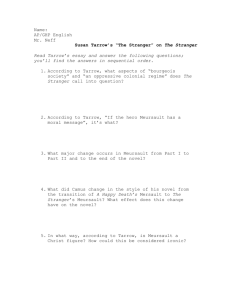Casey Comments
advertisement
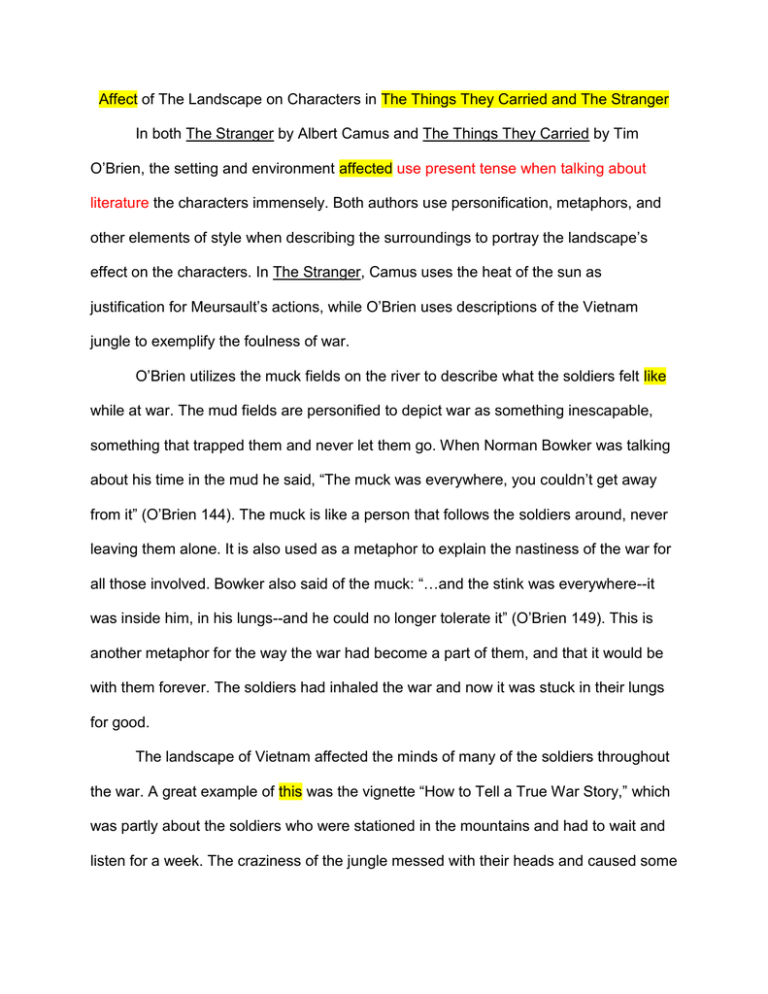
Affect of The Landscape on Characters in The Things They Carried and The Stranger In both The Stranger by Albert Camus and The Things They Carried by Tim O’Brien, the setting and environment affected use present tense when talking about literature the characters immensely. Both authors use personification, metaphors, and other elements of style when describing the surroundings to portray the landscape’s effect on the characters. In The Stranger, Camus uses the heat of the sun as justification for Meursault’s actions, while O’Brien uses descriptions of the Vietnam jungle to exemplify the foulness of war. O’Brien utilizes the muck fields on the river to describe what the soldiers felt like while at war. The mud fields are personified to depict war as something inescapable, something that trapped them and never let them go. When Norman Bowker was talking about his time in the mud he said, “The muck was everywhere, you couldn’t get away from it” (O’Brien 144). The muck is like a person that follows the soldiers around, never leaving them alone. It is also used as a metaphor to explain the nastiness of the war for all those involved. Bowker also said of the muck: “…and the stink was everywhere--it was inside him, in his lungs--and he could no longer tolerate it” (O’Brien 149). This is another metaphor for the way the war had become a part of them, and that it would be with them forever. The soldiers had inhaled the war and now it was stuck in their lungs for good. The landscape of Vietnam affected the minds of many of the soldiers throughout the war. A great example of this was the vignette “How to Tell a True War Story,” which was partly about the soldiers who were stationed in the mountains and had to wait and listen for a week. The craziness of the jungle messed with their heads and caused some of the men to lose their minds. In the vignette, Mitchell Sanders tells the story of what the men went though while waiting in the mountains: “Jungle, sort of, except its way up in the clouds and there’s always this fog--like rain, except its not raining--everything’s all wet and swirly and tangle up and you can’t see jack” (O’Brien 72). The setting of this story explains how it caused the men to go crazy. clarify They felt lost in the clouds and the silence made them feel completely alone. Sanders also talked about how the jungle could make you hear strange things and said, “...And the sounds, man. The sounds carry forever. You hear stuff nobody should ever hear” (O’Brien 72). The sounds the soldiers heard, the eerie music from nowhere in particular, contributed to their madness. These descriptions personify the jungle of Vietnam. It is also a metaphor for what the war did to the minds of the soldiers. The men in the jungle were not the only ones to end up a little crazy after a mission. Many soldiers came back from the war where their experiences changed their perspective on the world. At the end of the story, the soldiers don’t want to talk to colonel about what happened: “…the guys don’t say zip. They just look at him for a while…and the whole war is right there in that stare” (O’Brien 75). O’Brien uses this example of the effects of war to explain how the rest of the men in his platoon felt after the harrowing experience of war. None of them wanted to talk about it, yet you could see how they felt just by looking at them. In The Stranger, the physical world means everything to Meursault. His entire life is based on his observations of his surroundings. The author often uses simple diction to describe how Meursault is feeling. For example, when he is swimming with Marie he says, “the sun was doing me a lot of good,” and, “The water was cold and I was glad to be swimming” (Camus 50). This simple word choice tells the reader that Meursault is content with the way things are and nothing is bothering him. This pattern is evident elsewhere throughout the novel. Another example is from before the funeral, when he gives a description of the sky: “Above the hills that separate Marengo from the sea, the sky was streaked with red. And the wind coming over the hills brought the smell of salt with it. It was going to be a beautiful day” (Camus 12). This relatively straightforward vocabulary is used to show that he is feeling carefree and at peace. He does not give detailed descriptions when he is not bothered. His whole life is very simple and that is reflected in his word choice. The sun had a great effect on Meursault in many parts of the book. It usually is brought up when something is bothering him. Most of the time more literary devices in his descriptions, such as metaphor, personification, or vivid imagery, accompany it. His emotions become much stronger when he switches from his usually simple and straightforward descriptions of the setting to colorful, intense portrayals of the world. While at his mother’s funeral he said, “The sun was beginning to bear down on the earth and it was getting hotter by the minute” (Camus 15). At this point, Meursault starts to get agitated which is signaled by his use of personification. The sun becomes his enemy and he is battling against its repression. He is tired of the heat and wants to get the funeral over with. This feeling is repeated when he is hung over ?and says that the sun “hit me like a slap in the face” (Camus 47). Meursault is feeling groggy from the night before and the sun gives him a rude awakening. The use of personification also demonstrates how much the physical world affects him because the sun does not just wake him up; it hits him across the face. The setting has the greatest effect on Meursault when he shoots the Arab on the beach. The sun was shinning with so much intensity and heat that Meursault’s senses were overpowered. His descriptions of the scene become increasingly descriptive and vivid. He uses imagery such as “the heat was so intense that it was just as bad as standing still in the blinding stream falling from the sky,” and “All that heat was pressing down on me and making it hard for me to go on” (Camus 57). These examples portray how the sun is straining him and causing him to struggle. When he is near the Arab, Meursault feels as though the sun is pushing him closer to him. He explains the feeling when he says, “But the whole beach, throbbing in the sun, was pressing on my back,” and again with, “It was this burning, which I couldn’t stand anymore, that made me move forward” (Camus 59). CM about figurative language could go deeper. What two things are being compared? Why would he compare the sun with a weapon? What qualities do they share? Effect? Connotation? Tone? The final pages of Part One are filled with vivid imagery and metaphors that lead up to Meursault shooting the Arab. The change in tone and use of literary devices signal the confusion that Meursault is feeling. He feels overpowered by the sun and loses control of himself. In both stories, the setting and how it is described portray its effect on the characters feelings and behaviors. In The Stranger, Camus changes the tone and style dramatically to symbolize when Meursault’s emotions and mood were changing. O’Brien used the setting as a metaphor for all of the feelings the men he was with felt during and after the war. Both the setting and the style in which the setting was portrayed helped develop the characters in both novels. You offer some interesting comparisons. My main concern is with structure. In order to create stronger parallels I suggest that you compare the two texts directly, within one paragraph, at some point in the essay. Perhaps you cover each text in depth in separate paragraphs, then compare then directly in a subsequent paragraph. You could combine them to discuss the figurative language devices that they have in common, for example. Or, the use of figurative language to signal times where the landscape causes the most distress.
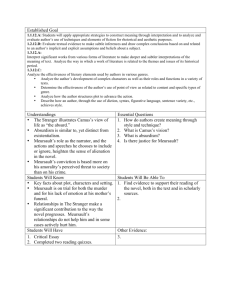
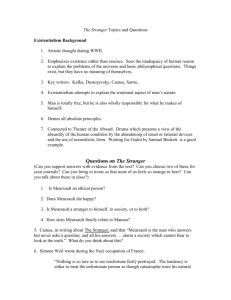
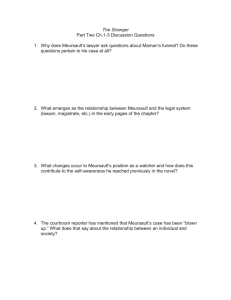
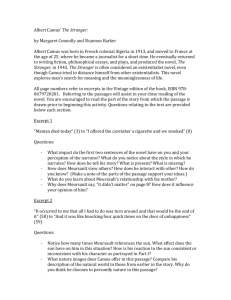
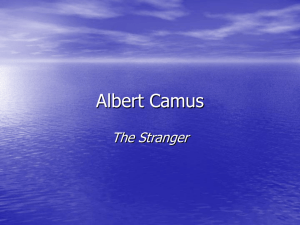
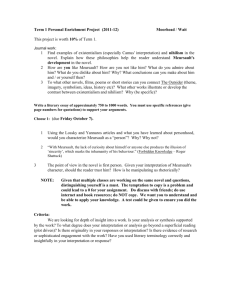
![Dialectical_Journal_The_Stranger_Part_1_Chapter_1[1]](http://s3.studylib.net/store/data/009474360_1-13e4833f16103af98d9991d7a02cbbc4-300x300.png)
